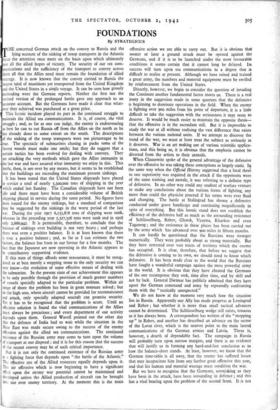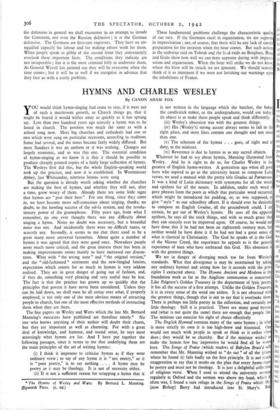FOUNDATIONS
By STRATEGICUS HE concerted German attack on the convoy to Russia and the lying account of the sinking of troop transports in the Atlantic ocus the attention once more on the basis upon which ultimately est all the allied hopes of victory. The security of our sea com- unications and the sufficiency of the transport to convey across them all that the Allies need must remain the foundation of allied trategy. It is now known that the convoy carried to Russia the argest total of munitions yet transported from the United Kingdom d the United States in a single voyage. It can be seen how grossly 'sleading were the German reports. Neither the first nor the revised version of the prolonged battle gave any approach to an accurate account. Bin the Germans have made it clear that what- ever they achieved was purchased at a great price.
This heroic incident played its part in the continued struggle to aintain the Allied sea communications. It is,_ of course, the vital struggle ; and, as far as one can judge, the enemy is endeavouring as best he can to cut Russia off from the Allies on the north as he has already done to some extent on the south. The descriptions of the sinking of the troop transports were too picturesque to be true. The spectacle of submarines chasing in packs some of the fastest vessels must make one smile; but they do suggest that a certain tactics has been evolved for dealing with convoys. They are attacking the very methods which gave the Allies immunity in the last war and have assured what immunity we enjoy in this. This battle, then, is not over by any means, but it seems to be established that the buildings are exceeding the maximum present sinkings.
It has been stated that the United States shipyards have placed in service a total of nearly 5,300,000 tons of shipping in the year which ended last Sunday. The Canadian shipyards have not been idle and there must have been a considerable volume of British shipping placed in service during the same period. No figures have been issued for the enemy sinkings, but a standard of comparison may be suggested by the sinkings in the worst period of the last war. During the year 1917 6,235,878 tons of shipping were sunk, whereas in the preceding year 2,327,326 tons were sunk and in 1918 only 2,666,942. - It is permissible, therefore, to conclude that the balance of sinkings over building is not very heavy ; and perhaps there was even a positive balance. It is at least known that there is now a positive balance ; and, as far as I can estimate the two factors, the balance has been in our favour for a few months. The fact that the Japanese are now operating in the Atlantic appears to be contributory supporting evidence.
If this state of things affords some reassurance, it must be recog- nised as at best merely a stepping stone to the only security we can ever know—the evolution of some effective means of dealing with the submarine. In the present state of our achievement this appears to be only possible through the provision of much greater numbers of vessels specially adapted to the particular problem. Within air range of shore the problem has been in great measure solved ; but on the high seas, where aircraft cannot be provided for reconnaissance and attack, only specially adapted seacraft can promise security. Yet it has to be recognised that the problem is acute. Until an effective solution is found the vital communications of the Allies must always be precarious ; and every department of our activity depends upon them. General Wavell pointed out the other day that the defence of India had to wait while the situation in. the Near East was made secure owing to the success of the enemy offensive against the allied sea communications. The continued existence of the Russian army may come to turn upon the volume of transport at our disposal ; and it is for this reason that the success of the recent convoy may be of such critical importance.
But it is not only the continued existence of the Russian army as a fighting force that depends upon " the battle of the Atlantic." The effective use of the Allied resources equally depends upon it. The air offensive which is now beginning to have a significant effect upon the enemy war potential cannot be maintained and developed unless the Allied production of aircraft can be brought into use over enemy territory. At the moment this is the main
offensive action we are able to carry out. But it is obvious that sooner or later a ground attack must be opened against the Germans, and if it is to be launched under the most favourable conditions it seems certain that it cannot long be delayed. Its success will turn upon sea communications to a degree that is difficult to realise at present. Although we have raised and trained a great army, the numbers and material equipment must be swelled by reinforcement from the United States.
Directly, however, we begin to consider the question of invading the Continent another fundamental factor meets us. There is a real irony in the suggestion made in some quarters that the defensive is beginning to dominate operations in the field. When the enemy is fighting over goo miles from his point of departure, it is a little difficult to take the suggestion with the seriousness it may seem to deserve. It would be much easier to maintain the opposite thesis— that the offensive is in the ascendant still. But it is impossible to study the war at all without realising the vast difference that exists between the various national units. If we attempt to discover the trend of the war, we must at least treat the subject as seriously as it deserves. War is an art making use of various scientific applica- tions, and this being so, it is obvious that the emphasis cannot be diverted from the artists to their utensils.
When Clausewitz spoke of the general advantage of the defensive over the offensive he was taking these conceptions as largely static. In the same way when the Official History suggested that a local three to one superiority was required in the attack if the opponents were of the same training and morale, it was referring to a definite type of defensive. In no other way could any student of warfare venture to make any conclusions about the various forms of fighting; any more than could the physicist proceed if his terms were ever fluid and changing. The battle at Stalingrad has shown a defensive conducted under grave handicaps and continuing magnificently in spite of everything. But this heroic stand does not establish the efficiency of the defensive half as much as the astounding resistance of Schhisselburg, Rzhev, Ghatsk, Vyazma, Kharkov and even Taganrog ; and the resistance in these places has been carried out by the army which has advanced over 900 miles in fifteen months.
It can hardly be questioned that the Russians were stronger numerically. They were probably about as strong materially. But they have retreated over vast tracts of territory which the enemy has occupied. It is clear, therefore, that before we suggest that the defensive is coming to its own, we should need to know which defensive. It has been made clear to the world that the Russians have fought a wonderful campaign against the most powerful army in the world. It is obvious that they have cheated the Germans of the one recompense they seek, time after time, and by skill and not by luck. General Dietmar has publicly admitted that they have upset the German command and army by repeatedly confronting them with the " tactically unexpected."
We do not know at the moment very much how the situation lies in Russia. Apparently our Ally has made progress at Leningrad and Rzhev ; but whether it is more than small tactical advances cannot be determined. The Schhisselburg wedge still exists, tenuous as it has always been. A correspondent has written of the " mopping up " in Rzhev, and another has described an advance on the sector of the Lovat river, which is the nearest point to the main lateral communications of the German armies and Latvia. There is, however, a dearth of dependable fact. The campaign in Russia will probably turn upon narrow margins, and there is no evidence that will justify us in forming any hard-and-fast conclusion as to how the balance-sheet stands. At least, however, we know that the German time-table is all awry, that the enemy has suffered losses that may incapacitate him from any further great offensive this year, and that his human and material wastage must condition the war.
But we have to recognise that the Germans, astonishing as they have been in the attack, have been astounding in defence ; and this has a vital bearing upon the problem of the second front. It is not the defensive in general we shall encounter in an attempt to invade the Continent, not even the Russian defensive ; it is the German defensive. The Germans are first-rate engineers. They have an un- equalled capacity for labour and for making others work for them. When people speak so glibly of the second front they conveniently overlook these important facts. The conditions they indicate are not insuperable ; but it is the most criminal folly to underrate them. As General Wavell has pointed out they will be overcome when the time comes ; but it will be as well if we recognise in advance that they face us with a costly problem. of our race. If the Germans excel in organisation, we are supreme in improvisation ; not, of course, that there will be any lack of careful preparation for the invasion when the hour comes. But such action as the seaborne raid on Tobruk and the laid raids on Benghazi, Barce and Gialo show how well we can mate supreme daring with improi: sation and organisation. When the hour will strike we do not know, where the blow will be struck we are ignorant. We should scarcely think of it as imminent if we were not lavishing our warnings upon These fundamental problems challenge the characteristic quality the inhabitants of France.



























 Previous page
Previous page